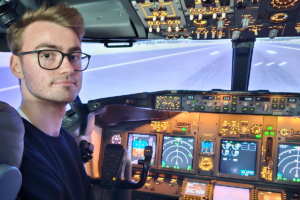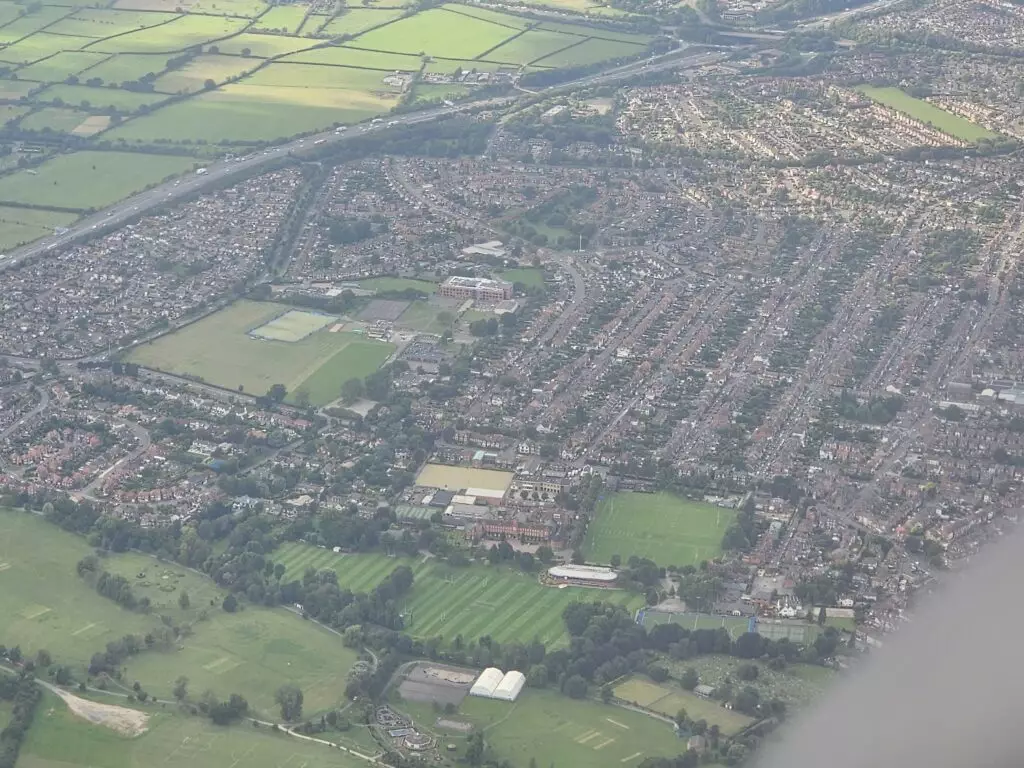Alex Webster
Trent College 2013-2020
CCF, RAF Section

“If it was not for Trent, I would not have wanted to pursue the path of flying”.
Flying at 3000ft in a Piper Pa28-161 single engine piston aircraft, Alex took some wonderful aerial photographs of Trent College this summer, a little over three years since he left. “It was a really amazing experience as I transited through East Midlands air traffic control zone, to see my old school from 3000ft!”
Attributing his confidence and academic ability to take on the theoretical demands of flying training entirely to his educational experience at Trent College, Alex is literally hours away from joining a flight academy with sights firmly set on a career as a commercial airline pilot.
Alex is currently building up his flying hours to 100 PIC (pilot in command) which will allow him to progress to an airline academy, for further qualification to secure his eligibility for airline selection, with dreams of becoming a commercial airline pilot. “My sights are set on British Airways and their young pilot scheme”.
Alex left Trent College in 2020 and whilst he was keen to start flying training, thanks to his time in the schools CCF’s RAF Section, Alex had to wait until 2021 to obtain his private pilot license (PPL).
“Leaving school when I did was a massive shock considering A-level exams had been cancelled and school had ended abruptly for me, in the space of a few days. Following on from that, the lockdowns meant that I wasn’t able to fly and so my PPL license was on hold.”
Whilst he waited for flying to restart, Alex got a temporary job working at Amazon which enabled him to save the additional funds that he needed to pay for the initial license training.
In early summer 2021, Alex finally obtained a PPL which allowed him to fly light single propeller aircraft, and so began the long journey of building flying hours from 10 ‘Pilot in Command’ hours to the 100 hours required to qualify for a commercial pilot license course. “I did my training at the local club, Sherwood Flying Club which is based at Nottingham City Airport in Tollerton, and I still fly there now”.
After obtaining his license, and to help fund further training, Alex started a job working in stock management for John Lewis Operations Department, where he currently still works. In March 2022 he started an intense ground school programme which required him to sit exams in 13 subjects, from meteorology and aircraft general systems knowledge to general navigation and human performance and limitations, involving a mix of biology and psychology. “Lots of people opt to study this course full time, as the amount of content to be learned is immense, I however studied part time whilst working, and so it took me just over 15 months to pass all exams, with no resits and averaging 93% in my test results”.
During this time, at the end of 2022, Alex was dealt a blow when he was grounded due to a medical complication with his hearing in one ear and, understanding the strict regulations in flying, was concerned that he would never be allowed to fly again. “I was really worried but thankfully, after 8 months and all my exams now complete, I was medically cleared to fly”.
By the end of the summer 2023, Alex is very close to reaching his required pilot hours, having accumulated over 70 hours PIC. As soon as he reaches 100 hours, Alex hopes to join the L3 Harris Airline Academy where he will train for a multi-engine aircraft commercial license and instrument flying “we fly through cloud and in poor visibility, following specific procedures and undertaking various bits of aircraft tech”.
This further training takes around four and half months to complete and, confident of the current job prospects from this particular academy, and the industry overall, Alex hopes to graduate into employment with a commercial airline. “My ambition is to fly for British Airways who are asking for the best cadets with higher than 85% ground school exam average and first series passes on practical flight exams.”
“I believe Trent set me up well for the theoretical side to my learning and certainly through my time there helped me be more confident as a person which is normally a key personality trait airlines look for in their pilots.”
“Equally, if it was not for Trent and the CCF I would not have wanted to pursue the path of flying; I believe that the air experience flight I got to go on at RAF Cranwell, during Year 10, was the moment I knew that my love for aircraft had now extended into a love of flying them too.”
“I had initially wished to join the RAF as a pilot at RAF Cranwell and become an officer and fly multi engine transporters, however as a mandatary requirement on my medical certification I wear glasses to fly, and the RAF requires a minimum level of eyesight that [commercial] airlines do not.”
“It has certainly been a road of ups and downs through my now five years of flying, and the three years since leaving Trent in particular. But now only about a year away from qualifying and things are looking good, and very exciting!”.
Ben Hayton, CCF Contingent Commander at Trent College says “Alex was a keen member of the CCF and was one of the leading figures in the RAF Section. It was always great to watch him work with the younger Cadets. I’m thrilled that his interest in aviation is still going strong and wish him all the very best with his promising flying career”.
